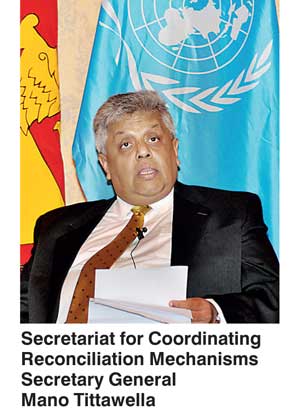Friday Feb 20, 2026
Friday Feb 20, 2026
Saturday, 3 September 2016 00:45 - - {{hitsCtrl.values.hits}}
Sustaining peace should be the number one priority of Sri Lankans, a top official said yesterday, as the country takes its first steps towards reconciliation and addressing long ignored issues of minorities.
Secretariat for Coordinating Reconciliation Mechanisms (SCRM) Secretary General Mano Tittawella delivering the opening remarks ahead of United Nations Secretary General Ban Ki-moon’s address in Colombo on Friday recapped the steps taken by the Sri Lankan Government to foster reconciliation since they came to power in 2015.
“Sustaining peace is, and must be, the number one priority. The new Government took office with a commitment to securing long term peace and reconciliation, premised on the principles of good governance while strengthening democratic institutions and ending long years of impunity and inequality,” he said.
In the last few months the Consultation Taskforce has held public hearings with communities across the country, and initial reports indicate a willingness to cooperate, need for trust building, a viable commitment and action plan for ground level delivery of high quality public services and the need to create opportunities for sustainable livelihoods.
The Government has also taken steps to move forward with the establishment of the Office of Missing Persons and the issuance of Certificates of Absence. Moves that will help families across the country to establish what happened to their loved ones, enabling them to move forward in an appropriate way, Tittawella stressed.
The Reparations and Truth Seeking Commissions will be established and a suitable Accountability Mechanism will follow, he assured. The Government has already announced it would introduce a Truth Seeking Commission in early 2017.
A new National Security Act is also in the pipeline to replace the often maligned and abused Prevention of Terrorism Act (PTA). The practice of confession-based convictions will give way to more modern, humane and effective investigative practices.
The critical importance of psycho social support and assistance for enlightened education has been recognised and plans are being drawn up to support these initiatives, Tittawella noted.
“Rectifying gender inequalities and empowering women, remains at the core of all these plans and will bring justice and equality to them too. The reconciliation and no recurrence program touches and advances the progress on many of the Sustainable Development Goals that Sri Lanka is committed to.”
“What is critical is that we see sustaining peace and promoting reconciliation as a national responsibility. It is a commitment requiring the hearts and minds of people from all corners of Sri Lanka,” he said.